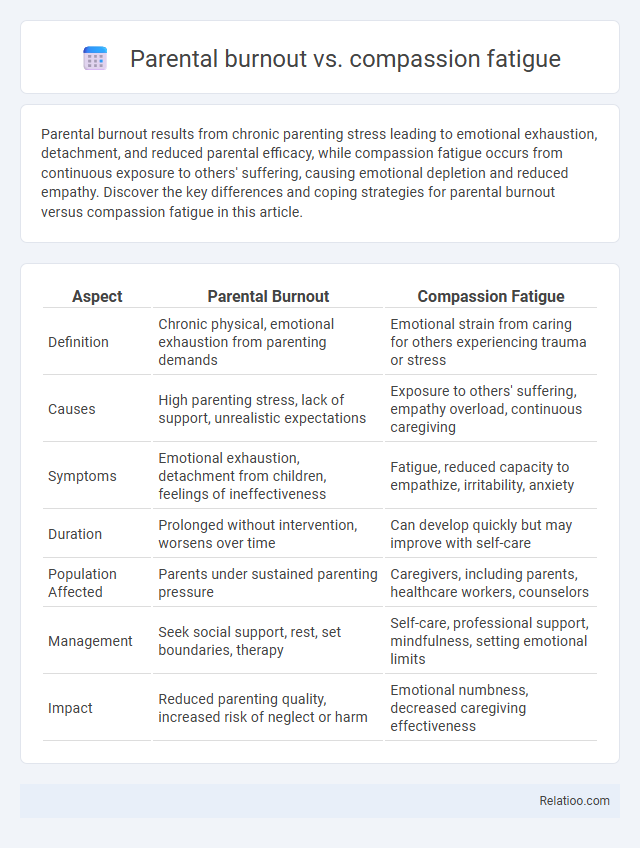Parental burnout results from chronic parenting stress leading to emotional exhaustion, detachment, and reduced parental efficacy, while compassion fatigue occurs from continuous exposure to others' suffering, causing emotional depletion and reduced empathy. Discover the key differences and coping strategies for parental burnout versus compassion fatigue in this article.
Table of Comparison
| Aspect | Parental Burnout | Compassion Fatigue |
|---|---|---|
| Definition | Chronic physical, emotional exhaustion from parenting demands | Emotional strain from caring for others experiencing trauma or stress |
| Causes | High parenting stress, lack of support, unrealistic expectations | Exposure to others' suffering, empathy overload, continuous caregiving |
| Symptoms | Emotional exhaustion, detachment from children, feelings of ineffectiveness | Fatigue, reduced capacity to empathize, irritability, anxiety |
| Duration | Prolonged without intervention, worsens over time | Can develop quickly but may improve with self-care |
| Population Affected | Parents under sustained parenting pressure | Caregivers, including parents, healthcare workers, counselors |
| Management | Seek social support, rest, set boundaries, therapy | Self-care, professional support, mindfulness, setting emotional limits |
| Impact | Reduced parenting quality, increased risk of neglect or harm | Emotional numbness, decreased caregiving effectiveness |
Understanding Parental Burnout
Parental burnout is a state of physical, emotional, and mental exhaustion caused by the chronic stress of parenting, distinct from compassion fatigue which mainly affects caregivers in professional roles. Unlike compassion fatigue, parental burnout stems from overwhelming parenting demands, feelings of incompetence, and emotional distancing from your children. Understanding parental burnout involves recognizing these specific stressors and addressing them through self-care, support systems, and realistic parenting expectations.
Defining Compassion Fatigue
Compassion fatigue is a state of emotional, physical, and mental exhaustion that results from prolonged exposure to caregiving stress, commonly affecting professionals and parents engaged in intense empathetic roles. Unlike parental burnout, which is characterized primarily by overwhelming exhaustion, detachment, and feelings of inefficacy directly related to parenting, compassion fatigue encompasses a broader depletion of empathy and reduced ability to feel compassion, often linked to secondary traumatic stress. Understanding the distinct impact of compassion fatigue on caregivers helps differentiate it from parental burnout and guides targeted interventions for emotional recovery.
Key Differences Between Parental Burnout and Compassion Fatigue
Parental burnout is characterized by overwhelming exhaustion, emotional distancing, and a sense of inefficacy related specifically to parenting roles, while compassion fatigue primarily affects caregivers and healthcare professionals due to prolonged exposure to others' trauma and suffering. Key differences include the source of stress--parental responsibilities versus empathic engagement--and the types of coping mechanisms employed; parental burnout often involves withdrawal from family activities, whereas compassion fatigue leads to reduced empathy across various caregiving contexts. Understanding these distinctions aids in tailoring effective interventions for emotional exhaustion in both parents and professional caregivers.
Common Causes of Parental Burnout
Parental burnout often stems from chronic stressors such as lack of social support, excessive parental demands, and emotional exhaustion. Common causes include prolonged feelings of being overwhelmed by caregiving tasks, imbalance between parental responsibilities and personal needs, and insufficient rest or self-care. Unlike compassion fatigue, which arises from constant exposure to others' trauma, parental burnout specifically relates to the cumulative emotional toll of parenting duties.
Triggers of Compassion Fatigue in Parents
Triggers of compassion fatigue in parents include chronic exposure to their child's emotional needs, relentless caregiving demands, and lack of adequate support or respite. Emotional depletion arises from sustained empathy, especially when managing a child's trauma or behavioral challenges. Unbalanced parent-child dynamics and societal pressures intensify stress, contributing to compassion fatigue distinct from parental burnout, which is primarily linked to overwhelming parenting responsibilities and exhaustion.
Emotional and Physical Symptoms
Parental burnout involves overwhelming emotional exhaustion, chronic fatigue, and physical symptoms like headaches and sleep disturbances, differing from compassion fatigue which primarily affects caregivers through emotional numbness and reduced empathy. Compassion fatigue manifests as decreased emotional resilience and detachment from others' suffering, often without the intense physical exhaustion seen in parental burnout. Your awareness of these distinctions can help identify specific emotional and physical symptoms, enabling targeted support and effective coping strategies.
Impact on Family Dynamics
Parental burnout significantly disrupts family dynamics by causing emotional withdrawal, reduced parenting quality, and strained relationships, leading to increased conflict and decreased cohesion. Compassion fatigue, often experienced by caregivers outside the immediate family, can still indirectly affect your household by diminishing your emotional availability and increasing irritability. Recognizing these conditions is crucial for maintaining healthy family interactions and ensuring emotional support within the home.
Effective Coping Strategies
Effective coping strategies for parental burnout, compassion fatigue, and caregiver fatigue emphasize self-care practices such as regular physical activity, adequate sleep, and mindfulness meditation to restore emotional resilience. Establishing strong social support networks and seeking professional counseling can mitigate stress by providing emotional validation and practical guidance. Prioritizing realistic expectations and setting personal boundaries helps prevent overwhelm and promotes sustainable caregiving.
When to Seek Professional Help
Parental burnout and compassion fatigue both warrant professional help when persistent exhaustion, emotional detachment, or a sense of overwhelming inadequacy interfere with daily functioning and caregiving. Recognizing signs such as chronic fatigue, irritability, and feelings of hopelessness is crucial for timely intervention from mental health specialists. Early counseling or therapy can prevent long-term psychological consequences and support effective coping strategies for caregivers.
Building Resilience for Long-Term Wellbeing
Parental burnout and compassion fatigue both result from chronic stress but differ in their primary sources, with parental burnout stemming from overwhelming parenting demands and compassion fatigue arising from prolonged empathetic caregiving in professional or personal contexts. Building resilience through mindfulness practices, self-compassion, and establishing healthy boundaries can mitigate the effects of both conditions, promoting long-term emotional and psychological wellbeing. Structured support systems, including peer groups and professional counseling, enhance coping strategies and foster sustainable parental and caregiving resilience.

Infographic: Parental burnout vs compassion fatigue
 relatioo.com
relatioo.com